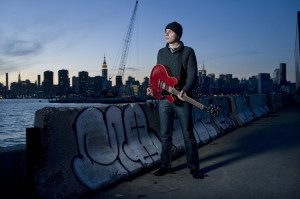Jazzing Up the City: An Inside Look into the Mind of Rafal Sarnecki
Few musicians out there at the dire age of 29 can say they’ve been nominated for a prestigious music award, played a European tour, and managed to assemble two separate bands in two different countries with the desire to create a third ensemble, all while having two master’s degrees. Polish jazz musician and aficionado of all things musical Rafal Sarnecki is one of those few — if not the only one.
Having moved to New York City only five years ago from his hometown of Warsaw, Poland, Sarnecki has not only mastered the English language, but also the concept of combining several independent melodic lines. Yet what is even more astounding is his penchant for physics and hypothesizing its theories in a musical sense.
Striving to create the perfect balance between his two passions, and a growing appreciation for classical symphonies, the composer wishes to one day play at the Jazz Gallery, a New York City venue he himself visits often to watch those he admires.
In an exclusive interview for GALO, Sarnecki reveals his second album’s high points, his respect for America, discusses the beginnings, and shares an interesting encounter he once had with the Romanian-Hungary border control.
GALO: When did your love for jazz music first begin?
Rafal Sarnecki: My adoration for jazz appeared quite late [in my life]. I think I was about 16-years-old when, for the first time, I felt that jazz was something exceptionally important to me. From the age of 15, I was already learning the basics of jazz improvisation at the music school that I was attending. Yet, at the very beginning, I didn’t treat jazz seriously; I treated my education of jazz like a classroom exercise in school. I was a fan of heavy metal. But, after a year, I came to the realization that jazz music complemented my personality more than heavy metal. The social circle I associated regarded jazz as something abnormal. And, I as a teenager, wanted to be thought as “abnormal” – I wanted to differentiate myself from my peers as much as I possibly could.
GALO: For most of your adolescence and early adulthood you were immersed in the study of physics. In 2000, you became one of the laureates at the Warsaw Olympics in Physics. You even went so far as to finish your Masters in Physics with honors at the University of Warsaw in Poland. Yet, despite your amounting success, you switched gears and decided to pursue the lifestyle of a musician. What caused this unexpected professional shift despite all the awards and promising physicist career?
RS: Many of my friends were extremely surprised with my decision that I wanted to pursue music on a professional level instead of physics. They thought my decision was irrational and sudden. In reality, the decision was well thought out and rational; it was absolutely not manifested by unexpected impulsivity. From the first time I tried to play a few chords on the guitar, I dreamt of becoming a musician. However, I didn’t believe that I could someday make money this way or nearly enough to live off it.
I was brought up in a family of engineers, and therefore, the profession of a musician was something very abstract to me; something unrealistic. During the time I was studying physics at the University of Warsaw, I started receiving more and more propositions to play at prestigious clubs and jazz festivals. It turned out that I was able to make my dream come true and become a musician. Of course this doesn’t mean that my passion for physics wasn’t authentic. I strive to continually deepen my scientific knowledge and I don’t intend to ever entirely abandon physics.
GALO: How did your family react to your decision? Were they surprised?
RS: I made the decision to devote my life to music, and not to physics, very gradually. My parents and those close to me had enough time to become accustomed to this decision; moreover, they greatly supported me. In essence, my parents’ reaction was very simple: “If you want to make music professionally then you have to finish music school.”
GALO: At what age did you first start playing?
RS: My first experience with the guitar came at the approximate age of 11. Previously, I attended piano lessons for two years, and I played the flute during music class in elementary school.
GALO: Your first real jazz accomplishment came in 2002 when you won first prize at the International Jazz Guitar Competition – Guitar City 2002 in Warsaw, Poland. Soon after, many others followed, including a nomination for the 2009 FREDERYK music award. How did it feel when that first degree of success came about in 2002? Did you ever think it would amount to the prestige that you have now?
RS: When I won the competition Guitar City, I felt extremely honored. The competition and the laureates of the previous years were discussed immensely in the social circle of young guitarists in Warsaw. Truth be told, the moment I realized that I won first place, I was frightened. I was keenly aware of the fact that I knew little about jazz, and at the same time, I was scared that I would be considered an expert in the field. This served as great motivation for me to practice.
(Article continued on next page)

